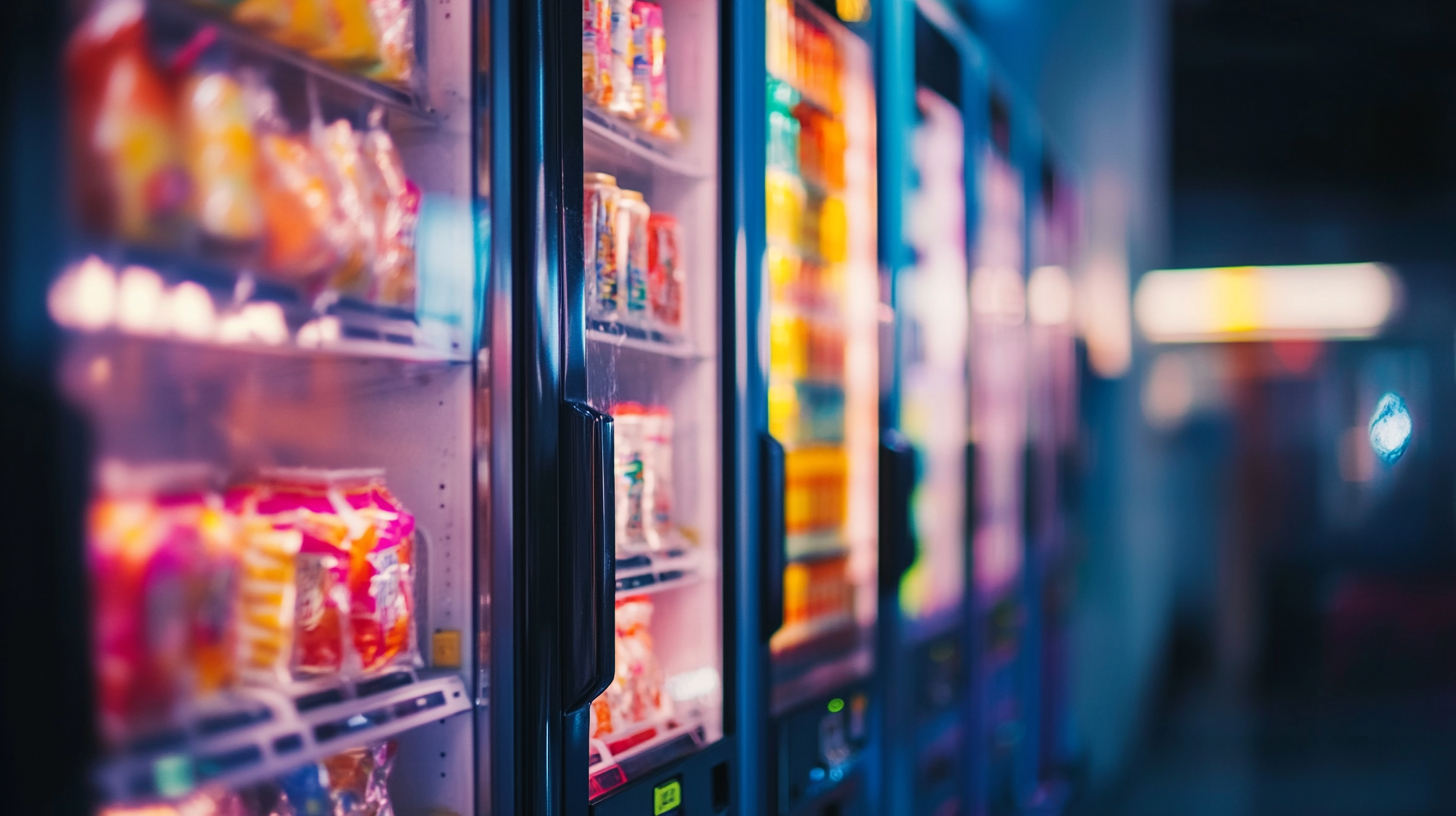How to Succeed in the Vending Machine Industry as a Global Buyer
In today's fast-paced world, the vending machine business has evolved into a dynamic and lucrative industry, attracting global buyers from various sectors. As consumer preferences shift towards convenience and accessibility, vending machines have become an essential part of our daily lives, offering everything from snacks and beverages to innovative products. For those looking to thrive in this competitive market, understanding the intricacies of the vending machine business is crucial.
As a global buyer, navigating the complexities of sourcing, pricing, and market trends can be overwhelming. Successful engagement in the vending machine business requires not only an eye for quality products but also a strategic approach to vendor relationships and an awareness of emerging technologies. This blog aims to provide valuable insights and actionable tips for global buyers eager to make their mark in the vending machine industry, ensuring that they harness opportunities for growth and achieve long-term success.

Identifying Profitable Vending Machine Products for Global Markets
The global vending machine industry is on an impressive growth trajectory, with the intelligent vending machine market projected to surge from $11.47 billion in 2025 to $36.89 billion by 2032. This remarkable growth, reflecting a compound annual growth rate (CAGR) of 18.2%, underscores the vast opportunities for global buyers looking to identify profitable products. With advancements in technology, particularly the integration of robotics into vending machines, businesses can leverage these innovations to cater to diverse consumer needs across different markets.
In pinpointing profitable vending machine products, one must consider market trends and consumer preferences. For instance, as health consciousness rises, vending machines stocked with organic snacks, beverages, and healthy meal options are becoming increasingly popular. Additionally, the aging society in countries like Japan presents unique market opportunities. Here, vending machines offering easy-to-use interfaces and ergonomically designed products can significantly appeal to elderly consumers, making this demographic a critical target for global buyers.
Moreover, the robust growth of e-commerce presents another avenue for identifying profitable vending machine goods. As online shopping continues to thrive, the demand for quick, convenient retail solutions grows, further validating the need for innovative vending machine offerings. By focusing on the right product assortment and strategic locations, global buyers can effectively tap into this lucrative industry and maximize their potential in a competitive market landscape.

Understanding Cultural Preferences and Trends in Snack Choices
Understanding cultural preferences and trends in snack choices is essential for any global buyer looking to succeed in the vending machine industry. Each region has its unique taste profiles, influenced by local ingredients, cooking methods, and historical factors. For instance, while North America might lean towards sweet snacks like chocolate bars and chips, Asian markets may prefer savory, umami-rich options such as seaweed snacks or wasabi peas. This difference necessitates a careful analysis of local consumer behavior and demand.
Moreover, trends in health and wellness are reshaping snack choices across the globe. Many consumers are becoming more health-conscious, seeking out organic, low-calorie, or high-protein alternatives. In Europe, for example, there is a growing preference for plant-based snacks, reflecting a larger shift towards sustainable eating habits. Tapping into these trends can be a game-changer for vending machine operators. By curating a selection of snacks that align with these cultural preferences and health trends, global buyers can enhance customer satisfaction and drive sales.
Additionally, seasonal and cultural events significantly impact snack consumption. For example, during the Lunar New Year, specific snacks like dried fruits and traditional sweets gain popularity in Asian markets. Similarly, the festive season in Western countries may see an uptick in demand for indulgent treats like chocolates and gourmet popcorn. Understanding these seasonal fluctuations allows buyers to stock their machines with culturally relevant products, ensuring they meet consumer needs at the right time.
Navigating International Regulations and Compliance in Vending Business
Navigating international regulations and compliance is critical for global buyers in the vending machine industry. Each country has its own set of laws that govern the sale and distribution of vending machines, which can vary significantly based on local market conditions, health and safety standards, and trade agreements. Understanding these regulations ensures that businesses can operate within legal frameworks, avoiding costly fines or delays in product launch.
Moreover, compliance with international trade laws is essential. Buyers must familiarize themselves with the import/export regulations of both their home country and the countries in which they plan to operate. This includes tariffs, customs duties, and documentation required for shipping. Conducting thorough due diligence and leveraging local legal expertise can assist buyers in navigating these complexities efficiently.
Additionally, maintaining compliance with health regulations is vital, especially when dealing with food and beverages in vending machines. Each region may have different safety requirements and labeling standards. Therefore, buyers should work closely with suppliers to ensure that all products meet local health codes, which not only fosters customer trust but also enhances the brand's reputation in the competitive vending market. By prioritizing compliance and understanding international regulations, global buyers can strategically position themselves for success in the vending machine industry.
Building Strong Relationships with Suppliers and Manufacturers Worldwide
Building strong relationships with suppliers and manufacturers worldwide is crucial for success in the vending machine industry, particularly for global buyers navigating complex supply chains. Effective supplier relationship management can significantly impact logistics efficiency, product quality, and overall business performance. Developing these relationships is not merely transactional; it involves understanding each partner's strengths and weaknesses, sharing risks and rewards, and fostering open lines of communication.
Establishing a resilient supply chain requires effort and commitment from both parties. As seen in recent trends, industries are focusing on diversifying their supply chains to mitigate risks and enhance performance. For instance, emerging markets like Southeast Asia present opportunities for companies willing to engage with local suppliers. By building strong, multi-directional relationships in these regions, businesses can capitalize on new logistics capabilities while ensuring that their supply chains remain healthy and adaptable.
However, this endeavor is fraught with challenges. Companies must navigate cultural differences, communication barriers, and varying expectations. Investing time in understanding the specific needs and business practices of each supplier can pave the way for smoother collaboration and better outcomes. Ultimately, a holistic approach to supplier relationship management that emphasizes trust, transparency, and shared goals will lead to a more sustainable and competitive standing in the vending machine industry.
Leveraging Technology for Inventory Management and Sales Tracking
In the rapidly evolving vending machine industry, leveraging technology for inventory management and sales tracking is essential for global buyers aiming for success. According to a report by IBISWorld, the vending machine industry is expected to reach $25 billion in revenue by 2025, driven by increased consumer demand for convenience and healthier options. To capitalize on this growth, implementing sophisticated technology solutions can streamline operations and enhance profitability.
Advanced inventory management systems, utilizing IoT (Internet of Things) devices, allow operators to monitor stock levels in real-time. This data-driven approach not only reduces the risk of stockouts but also minimizes overstock situations, optimizing the supply chain. A study from Technavio highlights that companies employing such smart inventory systems see an average reduction in operational costs by 20%, enhancing overall efficiency.
Sales tracking technology, including point-of-sale (POS) systems integrated with vending machines, provides invaluable insights into consumer purchasing behavior. This capability enables global buyers to analyze which products are performing well and adjust their offerings accordingly. A report from MarketsandMarkets indicates that the sales tracking market in the vending sector is projected to grow at a CAGR of 11.2% from 2021 to 2026, underscoring the importance of adapting to data analytics for informed decision-making.
Moreover, adopting cloud-based platforms for both inventory and sales data management facilitates seamless integration across various locations. By enabling real-time data accessibility, buyers can quickly respond to market trends and customer preferences, ensuring that their vending machine offerings remain relevant and competitive in a dynamic global marketplace.

